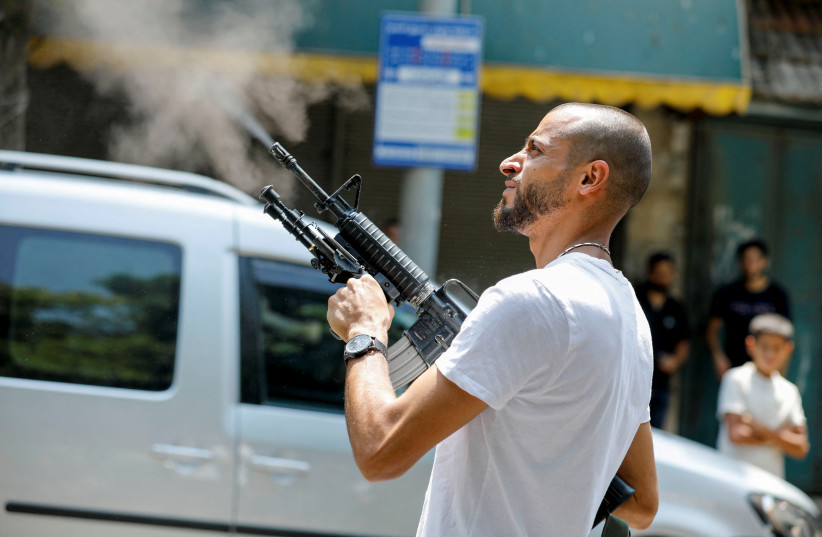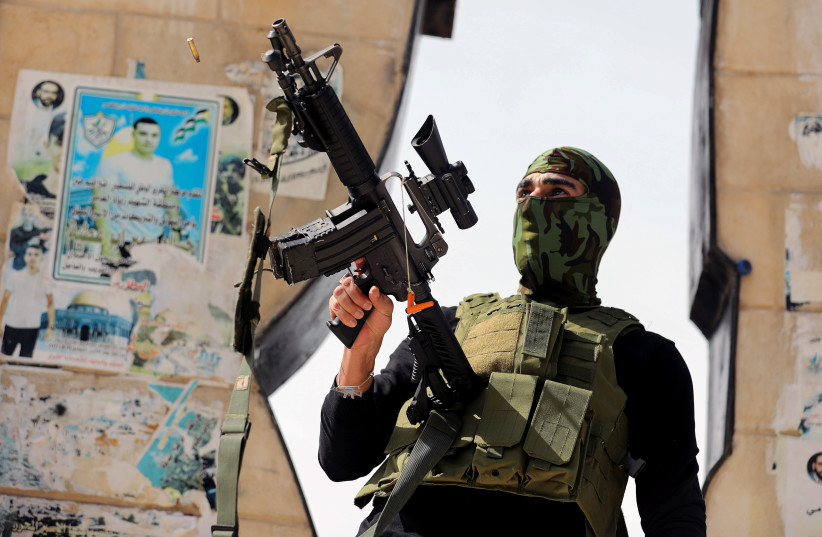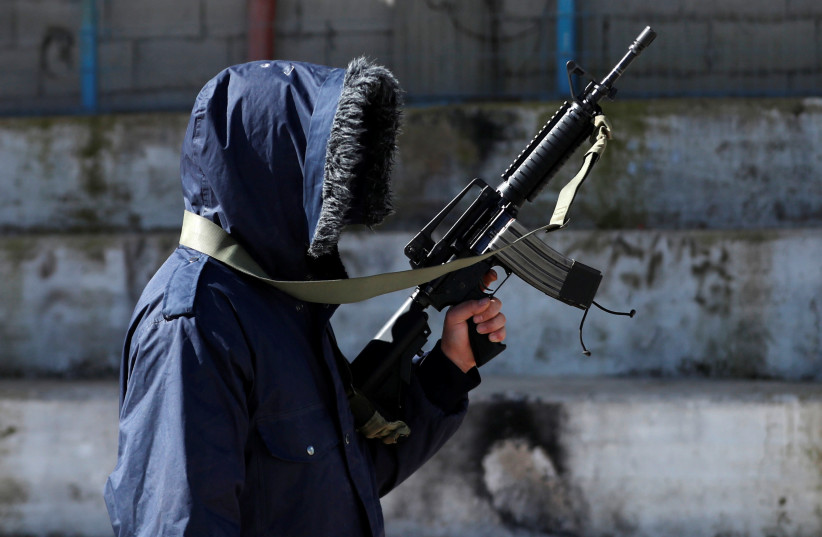by Khaled Abu Toameh
These past few months show that the West Bank is headed back to the days when wanted gunmen used to roam the streets of Palestinian communities.
 |
A Palestinian gunman fires a weapon in the air during the funeral
of Ibrahim al-Nabulsi, a senior commander of the Fatah's Al-Aqsa Martyrs
Brigades who was killed in armed clashes with Israeli forces, in Nablus
in the West Bank August 9, 2022.
(photo credit: REUTERS/RANEEN SAWAFTA)
|
Since the end of the Second Intifada, Palestinian Authority President Mahmoud Abbas has stated his public support for a nonviolent “popular resistance” against Israel as opposed to suicide bombings and shooting attacks. It now appears that the Palestinians in the West Bank have also endorsed another type of “resistance” – the “armed struggle.”
Abbas has, on numerous occasions, stated his opposition to violence and terrorism as a means of fulfilling Palestinian aspirations.
But he has never clarified what exactly he means when he talks about the “popular resistance,” although some of his advisers and senior officials refer to peaceful and nonviolent protests by Palestinian civilians against Israeli soldiers and settlers.
Yet many Palestinians consider the hurling of stones and Molotov cocktails at soldiers and settlers as an essential part of the “popular resistance.”
Until recently, most Palestinians appeared to heed the call by Abbas (and the Palestinian leadership) to engage in “popular resistance” activities.

What happened to the Palestinian stance?
In recent months, however, these activities have been accompanied by what many Palestinians describe as “armed resistance.”
The “popular resistance” Abbas talked about is quickly turning into an armed confrontation between Palestinian gunmen and soldiers, especially in the northern West Bank.
Dozens of gunmen stay awake all night to watch out for soldiers entering their areas.
In some instances, when the soldiers don’t show up, the gunmen go out searching for them at the entrances to the cities, villages and refugee camps.
The gunmen have replaced the Palestinian security forces, who often disappear from the streets just before the arrival of the soldiers.
In keeping with the spirit of the “popular resistance,” soldiers who carry our nightly incursions into Palestinian villages and refugee camps were until recently met with barrages of stones and Molotov cocktails.
Nowadays, nonetheless, the soldiers are almost always met with heavy gunfire from Palestinian gunmen.
Why are Palestinian gunmen turning more violent?
For some Palestinians, the armed clashes mark the beginning of a new-old era, one that is reminiscent of the violence and terrorism that took place during the first years of the Second Intifada, which erupted in September 2000.
“Obviously, the reality on the ground is changing,” said a senior Palestinian official in Ramallah. “We have a popular resistance during the day and an armed resistance during the night. The number of young men carrying weapons is increasing every day.”
“We have a popular resistance during the day and an armed resistance during the night. The number of young men carrying weapons is increasing every day."
Senior Palestinian official in Ramallah
A number of reasons are given for the growing use of firearms in Palestinian clashes with the IDF.
First, the Palestinian Authority does not seem to be capable of – or willing – to confront the gunmen, who enjoy the support of the Palestinian public.
Second, the gunmen, especially those in the Jenin and Nablus regions, are being armed and funded by Palestinian Islamic Jihad and Hamas. The leaders of the two Iranian-backed groups have made no secret of their desire to push Palestinians in the West Bank toward an armed confrontation with Israel. Several Fatah gunmen affiliated with the ruling Fatah faction headed by Mahmoud Abbas have no problem cooperating with Islamic Jihad and Hamas as long as the two groups are willing to offer them money and weapons.
Hamas and Islamic Jihad are hoping that the increase in shooting attacks and armed clashes against settlers and IDF soldiers will also contribute to the undermining of the Palestinian Authority’s control of the West Bank.
It's all political
They are also hoping that the semi-daily shooting attacks will ultimately encourage some members of the Palestinian security forces to join the fight against Israel, a move that they believe could expedite the collapse of the Palestinian Authority.

To encourage the continuation of the “armed resistance,” Hamas has begun documenting the number of shooting attacks carried out each month in the West Bank.
According to the organization, in July, Palestinians carried out 44 shooting attacks in the West Bank. Since the beginning of August, at least 33 shooting “armed resistance” attacks were carried out in the West Bank, Hamas claimed.
Unsurprisingly, Hamas and Islamic Jihad officials have expressed deep satisfaction with the increase in the number of armed attacks against Israelis in the West Bank. They are also calling on Palestinians to escalate the “armed resistance” and ignore Abbas’s “popular resistance” approach.
Events of the past few months have shown that the West Bank is headed back to the days when wanted gunmen used to roam the streets of Palestinian communities.
Until a few years ago, there were almost no gunmen on Israel’s list of wanted terrorists. This, however, has changed, as more and more gunmen are popping up. The Palestinian security forces are in control during the day, while the gunmen are in charge after sunset.
During the First and Second intifadas, masked activists and gunmen called the shots and operated as the police, judge and executioner. The West Bank appears to be slipping back to those days when thugs and gunmen decided who could live and who should die.
This is all happening at a time when Abbas and his Fatah faction are facing growing criticism over their failure to endorse good governance, pave the way for the emergence of new and young leaders, and allow Palestinians to hold general elections.
Khaled Abu Toameh
Source: https://www.jpost.com/arab-israeli-conflict/article-715846
No comments:
Post a Comment